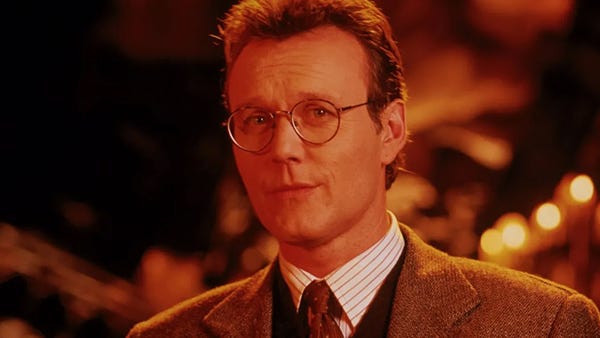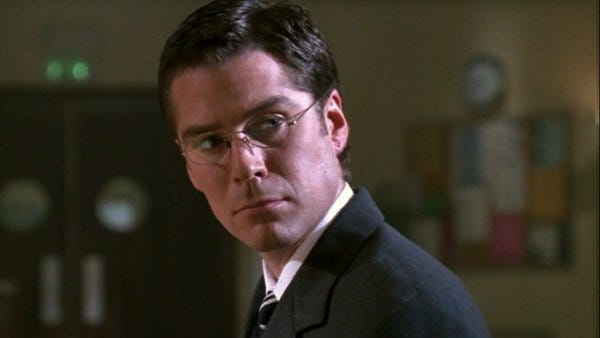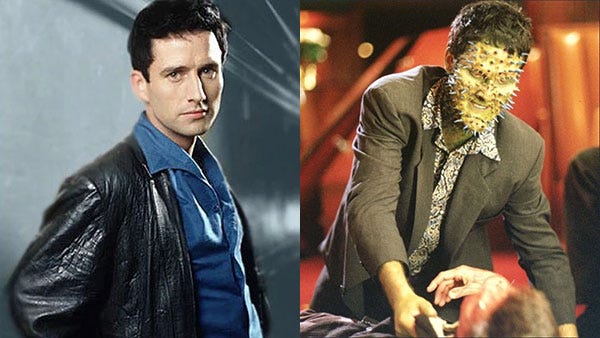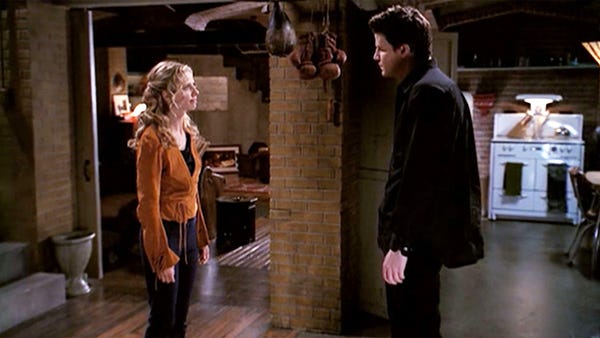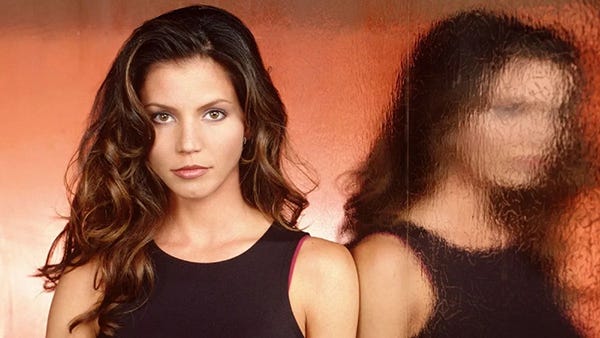Buffy In The Twilight Zone: Watcher Becomes Professor of Gothic Romance
A Twilight Zone/Buffy mashup where Giles and Wesley explore the influence of Gothic Literature in Buffy the Vampire Slayer and Angel
Author’s note; Credit where credit’s due: recently, it has become trendy to craft self-aware plays inside TV shows within movies, reminiscent of Charlie Kaufman’s Synecdoche, New York. Wes Anderson explored this concept in his latest film, Asteroid City, drawing on a narrating approach reminiscent of The Twilight Zone by Rod Serling in order to help the audience make sense of it. We’ve endeavored to do the same here with Buffy the Vampire Slayer and Angel.
INT. DIMLY LIT STUDY
The room is filled with antiques and books, shadows flicker on the walls. A poster on the wall of Asteroid City. A voice echoes, and the static begins to clear, revealing the silhouette of our Rod Serling-like host in a suit with a cigarette.
THE HOST: (Smoothly) “You’re traveling to another dimension, a dimension not only of sight and sound but of mind. A journey into a wondrous land where two Watchers, familiar to you, take on a role like never before. Welcome...to the Buffy Twilight Zone.”
INT. WATCHER’S ACADEMY - GOTHIC LITERATURE 101
Rows of eager students are seated, notebooks open, waiting for the lecture to begin. The blackboard reads, “Gothic Literature and its Real-Life Analogues.” Giles and Wesley, now co-teachers, are at the front, preparing their notes.
HOST: Picture if you will, an unexpected turn of fate, a twist in the fabric of reality, an alternate universe. Two familiar faces, Giles and Wesley, find themselves co-teaching in a school, an academy with a singular purpose: to mold the next generation of Watchers, (the instructors assigned to assist vampire Slayers like Buffy).
Yet, here their lessons go beyond the realms of Slayers and the supernatural. They delve deep into the heart of Gothic Literature, imparting wisdom from tales that have haunted mankind for centuries.
But here’s where the tale takes a peculiar turn: As part of their curriculum, these instructors bring forth episodes from the life of Angel, the vampire with a soul. They present his challenges, his torments, his redemptions, not as mere stories, but as genuine, tangible case studies in Gothic Lit.
In this academy, the lines between the real and the unreal blur, urging its students to question: In the dance of shadows, what is mere myth, and what is undeniable truth?
GILES: (Adjusting his glasses) Good morning, students. Today, we shall traverse the realms of Gothic Literature, and explore how reality and fiction, sometimes, blur their boundaries.
CLOSE-UP: Giles’ glasses as he polishes them. Pan upward.
GILES: (To the new Watchers) The truly equipped Watcher is well educated in all relevant areas, even literature. In this course, we specifically turn our attention to Gothic literature.
Tonight, we further delve into the application of our case study by exploring the depths of the duality that resides within the notorious vampire with a soul–Angel.
With a soul restored by the Romani, Angel is burdened with both remorse and clarity in the most modern gothic fashion. Re-ensouling vamps was a curse indeed, thus forcing the vampire to accept remorse, guilt, and torment for all the lives that they had taken as while soulless.
CUT TO:
WESLEY: (nervously whispering to himself) Don’t bungle this, old boy.
GILES: (utilizing the overhead projector) First, the quintessential Tortured Hero.”
The panel reveals Angel and Heathcliff, of Emily Brontë’s Wuthering Heights, emphasizing their shared agony.
GILES: Angel epitomizes the Byronic Hero: a creature of contradictions. He’s in perpetual conflict, reminiscent of the grand figures from our Gothic archives. This ceaseless battle between his dark instincts and the pangs of a guilt-ridden soul…Well, it makes him quite a textbook Gothic lead.
INT. WATCHER'S COUNCIL - CLASSROOM - NIGHT
GILES: (Revealing the new panel)
Our second examination is the Duality of Human Nature.
CLOSE UP: The split face of Angel, a stark contrast between light and shadow.
WESLEY: This bifurcation of character, so dramatically illustrated by Robert Louis Stevenson’s Jekyll and Hyde, resonates with Angel’s tumultuous existence. Not unlike one noble scholar moonlighting as a struggling… (voice trails off) rogue vampire hunter…
GILES: (pushing up his glasses) Ah, well speaking of duality, it would be remiss not to honor those who, despite their own inner… darkness, showed moments of sheer luminance.
WESLEY: (Pausing, with a touch of emotion) Indeed, Giles. It’s time to invoke the name of the brave half-demon we’ve lost: Doyle.
Next panel is shown, it’s Doyle.
WESLEY: His episode, “Hero,” encapsulates a profound message. Even beings born from the inferno have the capacity for great nobility.
CUT TO: Flashbacks of Doyle’s moments leading to his selfless act, fading out to Angel's tormented face.
INT. WATCHER'S COUNCIL - CANDLELIT LIBRARY - NIGHT
WESLEY: (Reminiscing) Buffy and Angel. Their bond, as we witnessed in episodes like “Becoming,” epitomizes the tragic romances so integral to Gothic tales. I daresay it’s reminiscent of Catherine and Heathcliff’s tumultuous affair.
GILES: (Flipping to a marked page in the tome) Take for instance the serial entry, “The Prom,” where Angel, not long after tormenting her as Angelus, in a gesture of profound love, decides to distance himself from Buffy.
WESLEY: (Pensively) Ah, the tragedy of the Byronic hero. Always ensnared, forever trapped between longing, obligation, and endless sorrow."
FLASHBACK: Angel & Buffy in “Sanctuary.” Angel’s voice is heavy with emotion as he confronts Buffy.
ANGEL: You moved on. I can't. You found someone new. I’m not allowed to, remember? I see you again, it cuts me up inside.
RETURN TO LIBRARY (mild murmurs in the class)
WESLEY: Heathcliff’s spiteful vengeance towards those who wronged him and his obsession with Catherine is akin to Angelus’ actions, especially towards Buffy. Both individuals were consumed by an obsession so deep that it defined their actions.
GILES: (pushing up his glasses) Yes, but then in “Passion,” Angelus doesn’t just want to harm Buffy; he wants to break her. His actions are cold, calculated, with every move intended to mentally and emotionally torment her, not dissimilar to Heathcliff’s machinations in the latter part of Wuthering Heights.
The room falls silent, the weight of the tragic tales settling heavily upon everyone.
GILES: (Softly) Omens, dreams, and curses have been deeply woven into the fabric of Gothic narratives…indeed, as well.
NEW WATCHER: (Slightly sarcastic) What, like reading tea leaves and psychics?
WESLEY: (Flipping open the tome) Exactly. And Doyle’s visions, which foretell the future, and which became Cordelia’s, inform his redemption. These come from the “powers that be,” which also are inspired by gothic horror.
GILES: (Cleaning his glasses thoughtfully) The “powers that be,” albeit ethereal and often aloof, are reminiscent of Gothic conventions. They hold knowledge of the cosmos, of destinies–
NEW WATCHER: (interrupts) What about the women?
GILES: Excellent question! In Angel, women play pivotal roles, from Cordelia Chase, who undergoes significant growth from a high school mean girl to a woman of vision, to Darla, Angel’s sire and the anchor to his dark past.
These characters, not unlike Mina and Lucy, in Dracula, are intertwined with the vampire protagonist, influencing his path and decisions. Their agency, emotions, and evolution are essential threads in the narrative fabric of the show.
WESLEY: And well, Cordelia finds herself not only battling external evils but also wracked by visions that cause her immense physical pain. These visions, not unlike Emily St. Aubert’s harrowing experiences in Ann Radcliffe’s The Mysteries of Udolpho–held against her will, tortured by both external forces and internal emotions–resonates strongly in Angel.
GILES: Indeed. Women in Gothic literature often bear the brunt of supernatural occurrences, acting as the bridge between the known and the unknown. This puts them in positions of great vulnerability but also bestows them with an uncanny strength and resilience.
NEW WATCHER: So, in a way, they’re both victims and champions in these stories?
WESLEY: Precisely. Take Drusilla, for instance. Her frailty and madness, the result of Angelus’ torment, mirror the damsel in distress trope, common in Gothic tales. Yet, her psychic abilities and unpredictable nature make her a formidable force.
To be continued? Join us next time on….the Buffy Twilight Zone!
Want more?
Calling all Buffy fans! Would you love to attend watch parties and other events celebrating Buffy and Angel? Come join us on our discord where you can find other Scoobies just like yourself conversing daily about these shows and the Buffy movie. Check back here all month for content on your favorite slayer and vampires, and follow us on Instagram for exclusive slayer content!







